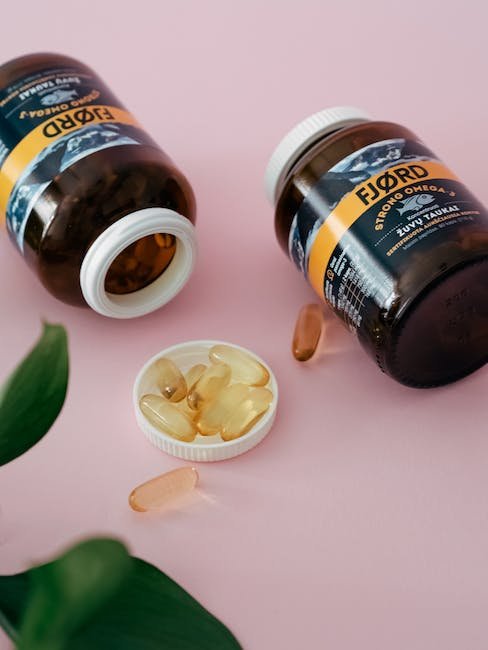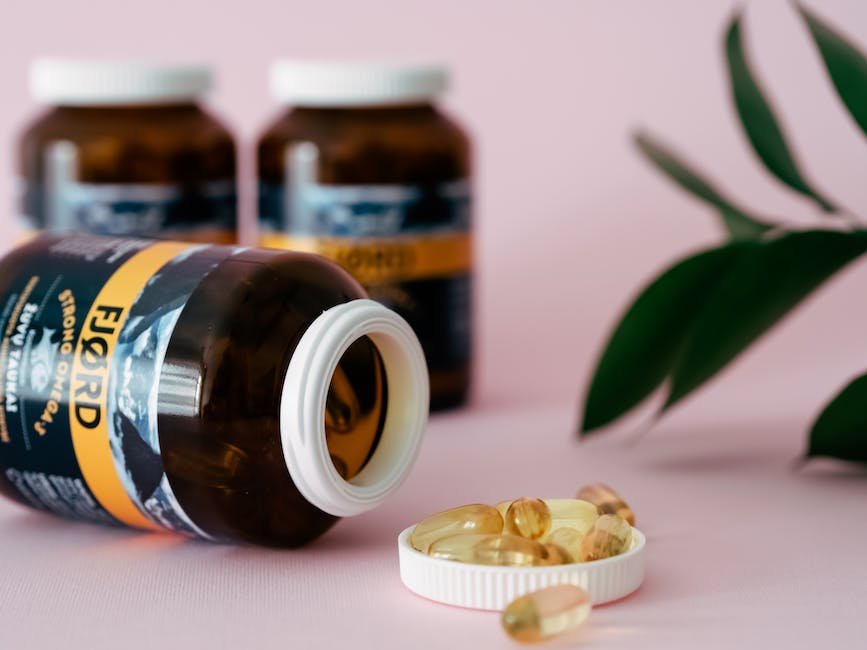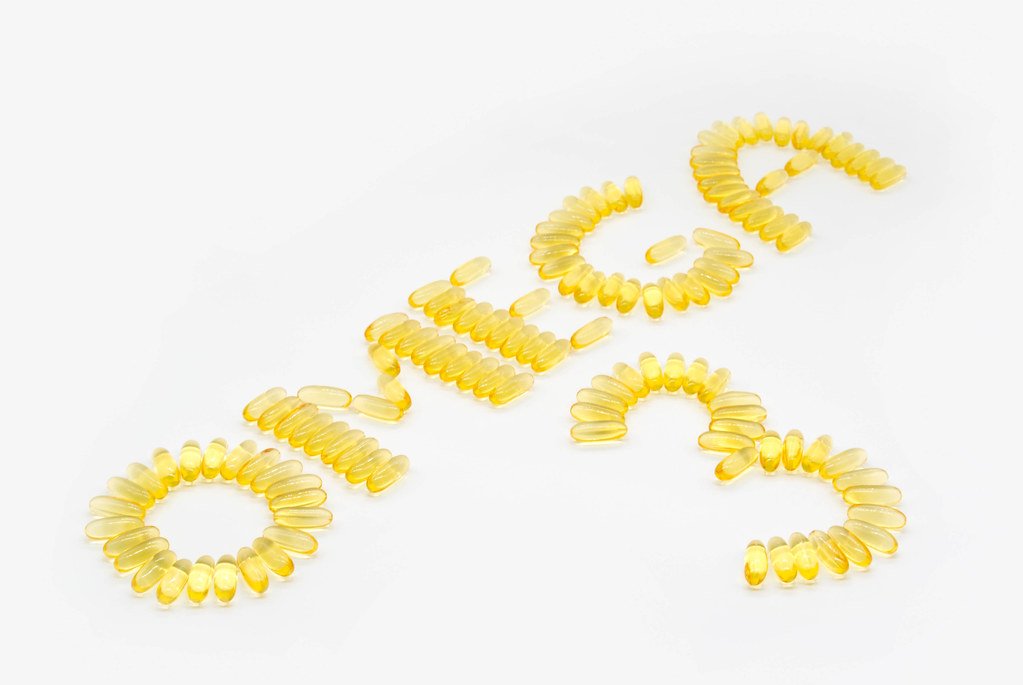After nine months of enveloping warmth, heartbeats, and unparalleled connection, the moment finally arrives when a woman embarks on her journey of postpartum recovery. As new mothers navigate the uncharted waters of sleep deprivation, healing bodies, and the overwhelming joy of nurturing a newborn life, it is essential to prioritize their own well-being. Among the myriad of considerations, the significance of incorporating omega-3 fatty acids into a postpartum diet cannot be overstated. These magical nutrients play a vital role in restoring physical and mental health while promoting optimal recovery after childbirth. Without further ado, let us delve into the captivating world of omega-3s and unravel their indispensable role in the postpartum period.
Table of Contents
- The Many Benefits of Omega-3s for Postpartum Recovery
- Understanding the Relationship between Omega-3s and Postpartum Depression
- Promoting Healing and Reducing Inflammation with Omega-3 Fatty Acids
- Expert Recommendations for Incorporating Omega-3s in Postpartum Nutrition Plans
- Q&A
- Closing Remarks

The Many Benefits of Omega-3s for Postpartum Recovery
Omega-3 fatty acids have long been recognized for their numerous health benefits, and their role in postpartum recovery is no exception. These essential fats are not only vital during pregnancy but continue to provide significant advantages during the early months after childbirth.
One of the notable perks of incorporating omega-3s into your postpartum diet is their ability to promote faster healing. Whether you’ve had a vaginal birth or a cesarean section, omega-3s can aid in reducing inflammation and accelerating the recovery process. By easing swelling and fighting off infection, these fatty acids support the body’s natural healing mechanisms, helping new mothers bounce back quicker and with less discomfort.
The benefits of omega-3s extend beyond physical recovery. These nutrients have also been linked to improved mood and mental well-being during the postpartum period. Research suggests that omega-3 fatty acids can enhance serotonin production, a neurotransmitter that plays a pivotal role in regulating mood. By including omega-3-rich foods such as fatty fish, flaxseeds, and walnuts in your diet, you can potentially alleviate postpartum blues and promote a more positive emotional state.
To ensure you’re getting an adequate amount of omega-3s for postpartum recovery, consider adding supplements to your routine or making dietary adjustments. Incorporate salmon and other fatty fish into your meals, sprinkle chia seeds on your morning yogurt or oatmeal, and snack on almonds or pistachios for a nourishing boost. As always, consult with your healthcare provider before making any major changes to your diet, particularly while breastfeeding.
Embracing the benefits of omega-3s can be an essential component of your postpartum recovery journey. From helping the body heal faster to supporting emotional well-being, these powerful fatty acids offer a natural and holistic approach to postnatal health.

Understanding the Relationship between Omega-3s and Postpartum Depression
Omega-3 fatty acids have gained significant attention in recent years for their potential role in mental health, particularly in relation to postpartum depression. Research suggests that these essential fats may play a vital role in reducing the risk and severity of postpartum depression.
Studies have consistently shown a correlation between low levels of omega-3 fatty acids and increased susceptibility to postpartum depression. These fatty acids, including EPA (eicosapentaenoic acid) and DHA (docosahexaenoic acid), are crucial for brain development and function, and their deficiency during and after pregnancy can have detrimental effects on mental well-being.
So, how do omega-3s actually help with postpartum depression?
- Regulating neurotransmitters: Omega-3 fatty acids can modulate key neurotransmitters involved in mood regulation, such as serotonin and dopamine. By enhancing the production and function of these neurotransmitters, omega-3s may help alleviate feelings of sadness and anxiety.
- Reducing inflammation: Postpartum depression is closely linked to inflammation in the body. Omega-3s possess anti-inflammatory properties, which can help counteract the inflammatory response and promote a more balanced immune system, potentially alleviating depressive symptoms.
- Promoting brain health: The brain undergoes significant changes during pregnancy and childbirth. Omega-3 fatty acids are critical for fetal brain development and the structure and function of the mother’s brain as well. Adequate levels of omega-3s can support optimal brain health, reducing the likelihood of experiencing postpartum depression.
It is important to note that while omega-3s may have a positive impact on postpartum depression, they should not replace professional medical advice or treatment. If you or someone you know is struggling with postpartum depression, consult a healthcare professional for proper diagnosis and guidance.

Promoting Healing and Reducing Inflammation with Omega-3 Fatty Acids
When it comes to promoting healing and reducing inflammation, one natural remedy stands out – omega-3 fatty acids. These essential fats have gained significant attention in recent years for their numerous health benefits. Research has shown that incorporating omega-3 fatty acids into your diet can support the body’s natural healing processes and help alleviate inflammation-related symptoms.
Omega-3 fatty acids, commonly found in fatty fish such as salmon, mackerel, and sardines, are renowned for their powerful anti-inflammatory properties. They work by decreasing the production of inflammatory molecules and promoting the production of anti-inflammatory substances, which helps to calm and soothe the body. Not only can omega-3 fatty acids help reduce inflammation in conditions like rheumatoid arthritis and inflammatory bowel disease, but they can also aid in healing injuries and surgical wounds.
In addition to their direct impact on reducing inflammation, omega-3 fatty acids also support overall healing processes. They play a crucial role in improving blood flow and enhancing the function of white blood cells, which are essential for combating infections and initiating the healing response. Moreover, omega-3 fatty acids contribute to the formation and maintenance of healthy cell membranes, ensuring that new tissues can grow and heal properly.
Considering the numerous health benefits associated with omega-3 fatty acids, incorporating them into your diet is highly recommended. Some excellent sources include fatty fish, flaxseeds, chia seeds, and walnuts. Alternatively, omega-3 supplements are also available for individuals who may struggle to meet their daily requirements through diet alone. Speak to your healthcare provider to determine the optimal dosage and form of omega-3 supplementation for your specific needs.
Give your body the natural support it needs and harness the healing and anti-inflammatory benefits of omega-3 fatty acids – your well-being will thank you!

Expert Recommendations for Incorporating Omega-3s in Postpartum Nutrition Plans
After pregnancy, it is crucial for new mothers to prioritize their nutrition to support both their own recovery and the healthy development of their infants. One essential component that should not be overlooked is omega-3 fatty acids. Experts agree that incorporating omega-3s into postpartum nutrition plans can have numerous benefits, including reducing the risk of postpartum depression, enhancing brain health, and supporting the production of breast milk.
So how can new moms ensure they are getting enough omega-3s? Here are some expert recommendations to help you incorporate this vital nutrient into your postpartum diet:
- Increase your fish intake: Fatty fish like salmon, trout, and sardines are fantastic sources of omega-3s. Aim to include at least two servings of fish per week in your meals. Be cautious of consuming fish high in mercury and opt for those lower in mercury levels.
- Consider fish oil supplements: If you struggle to consume enough fish, or if you are following a vegetarian or vegan diet, fish oil supplements can be a convenient alternative to obtain omega-3s. Consult your healthcare provider to determine the right dosage for you.
- Include plant-based sources: For those who prefer a vegetarian or vegan lifestyle, incorporating flaxseeds, chia seeds, walnuts, and hemp seeds into your meals can provide a good dose of omega-3 fatty acids.
Remember, it’s always beneficial to consult with a healthcare professional or registered dietitian before making significant changes to your diet, especially during the delicate postpartum period. Prioritizing omega-3s in your nutrition plan can contribute to a healthier postpartum journey for both you and your baby.
Q&A
Why are omega-3s important for postpartum recovery?
Omega-3 fatty acids play a crucial role in postpartum recovery as they help reduce inflammation, enhance brain health, and promote healing of tissues. They are also essential for the development of the baby’s nervous system if breastfeeding.
How can omega-3s aid in reducing postpartum depression?
Research suggests that omega-3s have a positive impact on reducing the risk of postpartum depression. These fatty acids help regulate hormones and neurotransmitters in the brain, enhancing the overall mood and emotional well-being of new mothers.
Is it safe to consume omega-3s while breastfeeding?
Absolutely! In fact, consuming omega-3s while breastfeeding is highly beneficial. These essential fatty acids are passed on to the baby through breast milk, supporting their brain and eye development. However, it’s always best to consult with your healthcare provider for specific recommendations.
Where can I find omega-3s in my diet?
Excellent dietary sources of omega-3s include fatty fish like salmon, mackerel, and sardines. Plant-based sources such as flaxseed, chia seeds, and walnuts are also rich in these fatty acids. If dietary intake is insufficient, omega-3 supplements can also be considered.
Are there any side effects of consuming too much omega-3s?
While omega-3s are generally safe, excessive consumption can lead to potential side effects such as blood thinning, digestive issues, or an increased risk of bleeding. It’s important to follow recommended dosages and consult a healthcare professional if uncertain.
Can omega-3s help with postpartum weight loss?
Omega-3 fatty acids do not directly contribute to weight loss, but they can play a supportive role. These healthy fats help control appetite, reduce inflammation, and promote a healthy metabolism. When combined with a balanced diet and regular exercise, omega-3s can aid in the postpartum weight loss journey.
How long should I continue consuming omega-3s postpartum?
There is no specific time frame, but it is beneficial to maintain a diet rich in omega-3s for the long term. These essential fatty acids offer numerous health benefits beyond postpartum recovery, supporting overall well-being and reducing the risk of chronic diseases.
Closing Remarks
In the symphony of life, the postpartum period is like the crescendo that follows the delicate melody of pregnancy. With all attention focused on the precious newborn, it’s easy for new mothers to inadvertently neglect their own wellbeing. Yet, just as a conductor needs harmony and balance to create a masterpiece, a mother’s recovery requires the same. And nestled within this orchestrating process lies the often-underestimated importance of Omega-3 fatty acids.
As we journey through the world of postpartum recovery, we find ourselves enchanted by the untold wonders of Omega-3s. These unsung heroes, found abundantly in fatty fish like salmon, mackerel, and sardines, contribute an orchestration of benefits to maternal health. From nurturing the body’s internal symphony to supporting mental well-being, their vital role is too significant to ignore.
In the realm of physical recovery, Omega-3s coax tender tissues towards healing with their anti-inflammatory powers. Like a gentle harmonizer, they soothe the soreness and rejuvenate strained muscles, alleviating the whirlwind of aches and pains that often accompany childbirth. Their unyielding support extends beyond just the body, diving into the depths of emotional restoration.
In a world where hormones dance and emotions sway, Omega-3s prevail as the calming conductor of the postpartum orchestra. Restoring balance within the mind, studies have shown that they can ease symptoms of postpartum depression and anxiety. Like a soothing lullaby, these incredible nutrients bestow tranquility upon the turbulent seas of mood swings, offering solace to those navigating the vast waters of motherhood.
But the virtuosity of Omega-3s stretches even further, evolving into a nurturing composition for the future. With each lingering note, these indispensable fats aid in the development of a newborn’s brain and eyes. As they intertwine with the delicate tendrils of growth, they establish a foundation for a vibrant and flourishing journey into life.
Like every great symphony, the presence of Omega-3s is an essential masterpiece waiting to be acknowledged. Their impact reaches far beyond the birthing suites, resonating with each new mother on her recovery voyage. So, dear readers, let this composition carry you towards the realm of postpartum healing, guided by the gentle chorus of Omega-3s. May their profound significance be the anthem that accompanies you as you embark on this magnificent, life-altering journey.
As an affiliate, my content may feature links to products I personally use and recommend. By taking action, like subscribing or making a purchase, you’ll be supporting my work and fueling my taco cravings at the same time. Win-win, right?
Want to read more? Check out our Affiliate Disclosure page.